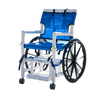Knowing the Signs: Seniors and Assisted Living
Millions of Americans live alone in the United States today. While a good portion of these people are healthy, independent, and able to handle the demands of running a home, many others are not. If you are a caregiver for someone in this latter category, you may be wondering if living at home is still the best option. But how, exactly, do you know if it’s time to initiate a conversation about assisted living?
Visit Dansons Medical for high-quality medical and accessibility equipment.
Care Options
It is important to first know that assisted living is not necessarily your only option. Independent living may be a more palatable experience for seniors with a need for autonomy. According to Modern Retirement, independent living provides basic services, such as housing, housekeeping, and meal preparation. This type of assistance can help overall healthy and active seniors remain that way for years to come. Assisted living is similar; however, seniors in this type of community also have access to more hands-on care, such as assistance bathing, medication management, and managing most daily tasks. In many cases, you can find a continuing care community that will allow the senior to seamlessly transition from independent to assisted living.
Look Out For Warning Signs
It’s an unfortunate reality, but some seniors are embarrassed or even in denial about their inability to live alone. They may be remiss to answer questions about how they’re doing. As a caregiver, you’ll need to evaluate their situation without being overbearing. Look for warning signs, which include:
- Worsening health problems. This includes mobility issues, such as severe arthritis, emotional problems, like depression, and cognitive decline up to and including Alzheimer’s.
- Declining hygiene and cleanliness. All the above health problems might leave a senior unable to handle their hygiene or maintain the cleanliness of their home. While there’s nothing alarming about a coffee cup in the sink or using dry shampoo instead of taking a full shower every once in a while, body odor, outdated food in the refrigerator, and unmanaged pest problems are red flags.
- Worsening abilities on the road. The idea of losing driving privileges is terrifying to most older adults. But, as On Health asserts, some issues, such as mobility, vision, and hearing troubles, can all make it dangerous for a senior to get behind the wheel. If your loved one can no longer safely navigate the streets or public transportation, assisted living may be on the horizon.
Other potential problems to look out for include aggressiveness, neglected pets, isolation, and whether they have a network of friends and family that can step in when you are unavailable.
It’s Time to Talk
Only you know your loved one’s personality. Keep this in mind as you initiate the conversation. It’s almost always best to plant the proverbial seeds early, enlist the help of your siblings, aunts, uncles, and their same-age friends, and find out what they love so much about their home. When you finally bring up the possibility of assisted living, make sure they have nothing but a positive image, lots of support, and reassurance that they will get to bring the best of their current life with them.
It’s not going to be easy, but making sure a loved one is in the right situation for their mental, physical, and cognitive health is paramount to their quality of life. If you’re looking for further resources, the links below are great touch points that can help you get the process started when the time is right.
One Is the Loneliest Number: Combating Senior Isolation
Dementia Symptoms, Causes, Types, Stages, and Treatments
How to Make Seniors Feel at Home in a New Living Space
Forms Needed to Act on a Loved One’s Behalf

Author: Lydia Chan
Lydia is the co-creator of Alzheimer’s Caregiver, a website that aims to provide tips and resources to help caregivers. Her mom was diagnosed with Alzheimer’s and Lydia found herself struggling to balance the responsibilities of caregiving and her own life. She is passionate about sharing her knowledge and experiences with caregivers and seniors. In her spare time, Lydia finds joy in writing articles about a range of caregiving topics.
- Dansons Medical


 Lifts
Lifts
 Patient Lifts
Patient Lifts
 Stand Assists
Stand Assists
 Standing Aids
Standing Aids
 Slings
Slings
 Parts & Accessories
Parts & Accessories
 Wheelchairs
Wheelchairs
 Ergonomic
Ergonomic
 Portable
Portable
 Reclining
Reclining
 Standing
Standing
 Sporting
Sporting
 Bariatric
Bariatric
 Ramps
Ramps
 Modular
Modular
 Portable
Portable
 Parts & Accessories
Parts & Accessories
 Walking Aids
Walking Aids
 Rollator Walkers
Rollator Walkers
 Canes
Canes
 Crutches
Crutches
 Parts & Accessories
Parts & Accessories
 Scooters
Scooters
 4-Wheel
4-Wheel
 Folding
Folding
 Parts & Accessories
Parts & Accessories
 Nursing
Nursing
 Pregnancy Comfort
Pregnancy Comfort
 Self-Care
Self-Care
 Pump Parts
Pump Parts
 Exercise Equipment
Exercise Equipment
 Treadmills
Treadmills
 Walking Pads
Walking Pads
 Rowing Machines
Rowing Machines
 Strength & Conditioning
Strength & Conditioning
 Massage Chairs
Massage Chairs
 Saunas
Saunas
 Hot & Cold Tubs
Hot & Cold Tubs
 Stethoscopes
Stethoscopes
 Surgical Instruments
Surgical Instruments
 Forceps
Forceps
 Scalpels
Scalpels
 IV Poles
IV Poles
 Oxygen
Oxygen
 Beds
Beds
 Electric Beds
Electric Beds
 Standing Beds
Standing Beds
 Mattresses
Mattresses
 Bed Accessories
Bed Accessories
 Bed Parts
Bed Parts
 Chairs
Chairs
 Medical Recliners
Medical Recliners
 Phlebotomy Chairs
Phlebotomy Chairs
 Stools & Task Chairs
Stools & Task Chairs
 Parts & Accessories
Parts & Accessories
 Tables
Tables
 Overbed Tables
Overbed Tables
 Medical Tables
Medical Tables
 Recovery Couches
Recovery Couches
 Cabinets
Cabinets
 Pool
Pool
 Pool Lifts
Pool Lifts
 Pool Fitness & Therapy
Pool Fitness & Therapy
 Pool Access Chairs
Pool Access Chairs
 Slings
Slings
 Parts & Accessories
Parts & Accessories
 Bath
Bath
 Toileting Aids
Toileting Aids
 Bath Lifts
Bath Lifts
 Shower Seats
Shower Seats
 Parts & Accessories
Parts & Accessories
 Portable Shower
Portable Shower
 Dansons Products
Dansons Products
 Transfer Aids
Transfer Aids
 Cushions
Cushions
 eBooks
eBooks
 Helpful Articles
Helpful Articles
 Reviews
Reviews
 Contact Us
Contact Us
 Create Account
Create Account
 Request a Quote
Request a Quote


Comments 0